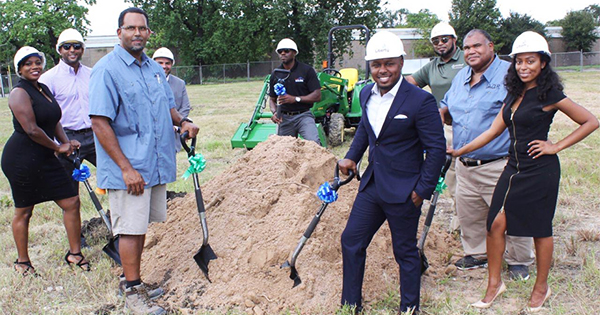Black investment groups, venture capital firms, and individual investors have been rising like a tidal wave in recent years.
Many Black men and women used the COVID-19 Pandemic to educate themselves about money, invest in businesses, and even purchase real estate. The pandemic also led to a rise in the number of Black entrepreneurs and business owners, as the Black Lives Matter movement and Juneteenth brought a new focus on racial equity.
“It’s amazing, the fact that it’s cool so it’s not even just podcasts, people are learning financial literacy through music,” entrepreneur, investor and podcaster David Shands told BLACK ENTERPRISE.
“There’s never been a time in history where rappers are injecting financial literacy into their music and now it’s cool. The whole culture is shifting to you’ve got to be smarter you’ve got to be more responsible with your money. I think it’s absolutely amazing.”
Investing has been on the rise in the Black community in recent years, but several Black people made fortunes investing in businesses and real estate in the 1980s, 1990s, and early 2000s.
If you take a look at the Atlanta skyline, you’ll see the decades-long work of Black CEO and investor, Herman J. Russell.
Russell, whose first property was a vacant lot he bought in 1946, built H.J. Russell & Co. into one of the nation’s largest black-owned construction and real estate firms. In addition to acquiring and developing numerous real estate projects in the Jim Crow South, H.J Russell is one of the largest black-owned companies in the U.S. and is regularly on the BE 100 list
Projects built by H.J. Russell include Hartsfield-Jackson Atlanta International Airport, the Georgia Dome, Philips Arena, Turner Field (former home of the Atlanta Braves), and Mercedes-Benz Stadium, (current home of the Atlanta Falcons). Russell passed away in 2014 and his sons Jerome and Michael now run the company
In 2014, Russell shared his advice for being a successful Black person in an industry with little minority participation.
“Do not hesitate,” Russell told BE in 2014. “Push for opportunity but most of all be persistent, prompt, and reliable. African Americans make up a huge percentage of the population so it is important that you work hard to increase the percentage of our participation and you should seek it as if your life depends on it.”
The late TLC Beatrice CEO Reginald Lewis, a Harvard-trained lawyer and entrepreneur, was the first Black man to build a billion-dollar company.
The Baltimore native launched his investment firm, the TLC Group, which in 1987 purchased Beatrice International Foods Cos., a manufacturer of processed meats, dairy products, and beverages with 64 food-processing and distribution companies in 31 countries.
“Reggie was not afraid of going beyond what Black business was, which was privately owned companies run by family members to be passed on to family members,” BET Founder Bob Johnson told BE in 2015. “He got access to public capital, which gives you leverage in deal-making.” Johnson is the founder and chairman of The RLJ Cos., a portfolio of companies with holdings in many industries.
Before he died in 1993, Lewis helped Black Americans gain access to financing on Wall Street. After Lewis passed, his wife Loida Lewis took over, and in the first two years of running TLC Beatrice, the company made more than $3 billion in net sales.
Moving into the 1990s, another Black businessman who paved the way was FUBU CEO, Draymond John.
John, who once sold hats on the street outside the famed Apollo Theatre in the early 1990s, is now a featured investor on NBC’s Shark Tank and has invested in numerous businesses including Bombas socks, Hells Bells Helmets, and Browndages.
Vista Equity Partners CEO Robert F. Smith made national headlines in 2019 when he paid off the tuition and student loans of the graduating class at Morehouse College. However, the Black billionaire has been an investor for more than two decades and sports a portfolio that includes more than $96 billion in assets and includes more than 80 enterprise software, data, and technology-enabled companies that employ over 100,000 people worldwide.
These men paved the way in Black investment and are shining examples for a growing chorus of figures and organizations that are pushing to make investing more popular and turn Juneteenth into a holiday focusing on financial literacy, business, and entrepreneurs for Black men and women.
Black Athletes and celebrities are also helping by starting their own VC funds and are investing and assisting minorities- and women-led businesses. Serena Ventures, the VC fund started by tennis legend Serena Williams, has made numerous investments in women-owned and minority-owned businesses.
NBA All-Star Kevin Durant’s Thirty5 Ventures and Stephen Curry’s Penny Jar Capital also invest in minority businesses, as do the VC firms started by rappers Shawn “Jay-Z” Carter and Calvin “Snoop Dogg” Broadus.
Wall Street veteran and finance coach Shareef “Ross Mac” McDonald has a unique name for this renewed interest for Black men and women.
“I love it, we call it the Digital Civil Rights Movement,” said McDonald. “Post George Floyd and during COVID we as a people were more intentional and saying no one’s going to give us anything we need to get it and take it for ourselves whether it’s knowledge or wealth and so I’m excited that people are now doing the things that our ancestors didn’t necessarily have access to even understand or comprehend.
“Now, people have the ability to buy stocks and so I love the fact that people are taking it amongst themselves to be submerged in the information and now you have Black content creators on Twitter, Instagram, and YouTube saying hey now is the time to buy stocks for cheap and so I love being a part of that and part of the digital Black wealth renaissance.
Celebrate Juneteenth 2023 with BLACK ENTERPRISE with month-long content that explores the history of prosperity and banking, and the future of investing and financial literacy for Black communities.
